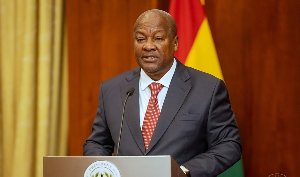The Chief Executive Officer of the Ghana Chamber of Telecommunications, Kwaku Sakyi-Addo, has called for a change in regulatory and policy direction to save the telecom industry from contracting in the face of deliberate attempts to milk telecom operators.
Mr. Sakyi-Addo, who heads an outfit set up recently by the telecoms operators to provide a platform where the operators can share matters of common interest, said the telecom industry is now suffering from unfair and discriminatory policies geared towards boosting government’s revenue mobilisation scheme at a time when competition has affected the bottom-line of the operators.
“The industry is treated as a cash-cow and we are slaughtering the cow. Soon there won’t be much milk, and so the outlook of the regulatory environment ought to have a long-term mindset rather than one that is centred on what we can extract from the industry in the short-term.
“About 38 percent of all revenues that telecom operators make go to government in the form of taxes. Apart from the quantum, it is also how regulators and Municipal, Metropolitan and District Assemblies (MMDAs) view the industry compared to other industries.
“For instance, there are districts in the country which are charging GH¢10 for every 15 metres of fibre-optic cable laid, and you ask: are they asking the same of the VRA and ECG for laying electricity cables as well as the GWCL for laying pipes?
“Of course not, because it wouldn’t make sense that you make demands of these institutions when you want infrastructure in your community -- and yet those demands are made of the telecom industry because it is seen as a cash-cow.
“If you charge Business Operating Permits that target the telecom companies and discriminate with such disparities between them and banks, insurance companies and large companies -- I mean, this is not a tobacco or an alcohol industry; this is telecommunications.
“If we accept that this is an industry that is an enabler and actually spurs economic growth and social activities, why would you target them for particularly excessive taxes? It doesn’t make sense,” he said.
Mr. Sakyi-Addo said the business operating environment of the telecom industry is heading south, while the operators are re-evaluating their investment and expansion projects in the country.
He explained: “With rising operation expenditure in the face of diminishing margins as a result of competition, the industry is hurting and, indeed, there is less money available for investment.
“We have to recognise that these companies are global companies and they have to make investment decisions based on where the conditions are attractive -- and that could be Moldavia, Afghanistan, South Sudan or DR Congo; it doesn’t have to be Ghana.
“We are in competition with other business destinations; and therefore if we do recognise that we need to make investments toward education outcomes, then the regulatory and policy posture ought to be supportive of that and not to take the cash today and run. That will not work to the benefit of our society and the country’s teeming youth, who are dying to work and be competitive in a global world today and tomorrow.”
Business News of Wednesday, 19 October 2011
Source: BFT













